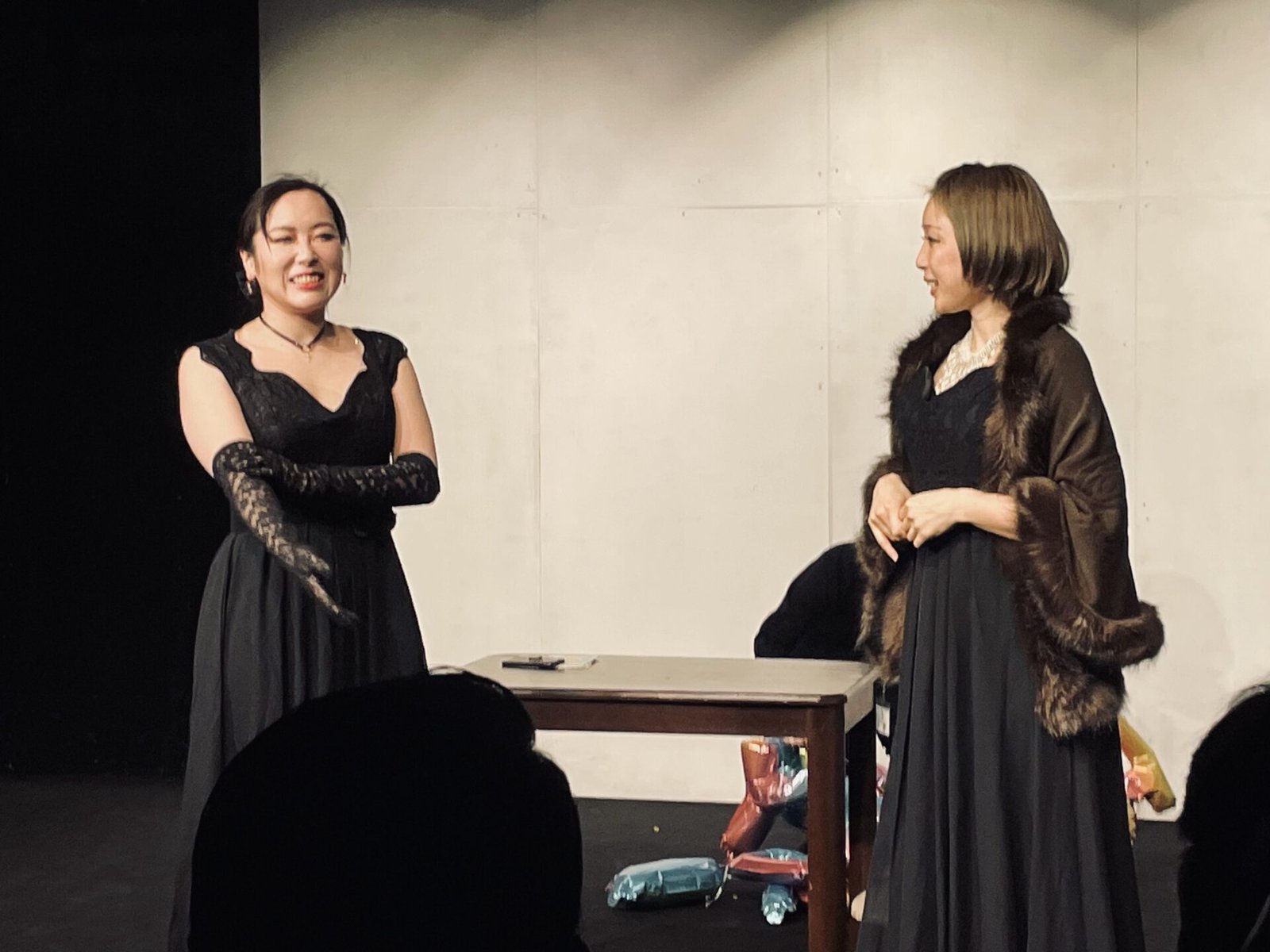On The Stage: Spotlighting Joshi in Theatre

On The Stage: Spotlighting Joshi in Theatre
By: Jeff Brown
Over the course of ten days, Monthly Puroresu journeyed out to five different stage plays, all starring members of the Joshi world. While the majority of the plays either featured current AWG members or alumni, there were wrestlers from Tokyo Joshi Pro-Wrestling, Diana, GPU COLOR’S and the freelance world. After going to various theaters and experiencing a wide range of genres, here are MP’s impressions of Joshi performing on the stage.
Toy Late Lie: “100 Things I Want to Do That I’ll Die Tomorrow” (Nao Kakuta)
100 Things I Want to Do That I’ll Die Tomorrow is a Toy Late Lie production that took place at the Base Theater. The Base Theater is one of 3 theaters in the same complex of Theater Green. Entering audiences were met by the producer, Shigeya Hagiwara, who guided them to their seats and chatted briefly with each patron, making a brief but meaningful connection. In many instances, these were regulars to the company, but it did not matter, and nobody was given special treatment. He gave a brief introduction to the crowd and was full of nervous energy and self-deprecating humor. Walking backwards, he knocked into one of the stage pieces, which was a building. It was genuine and relatable, giving the patrons a good laugh before the very somber story that was about to begin. The stage was a miniaturized cityscape with smaller houses in the foreground.
The play was a story about finding the real moments in life, seeing your friends and family, and connecting with them. Death is an inevitability, but when there is a set date, life changes, and that is what the characters all dealt with. It was a clever use of scenery to have many of the buildings serve as seats, tables, or counters for the people to go about their day around. Also, the portions of them walking added a nice visual as you saw them amongst the buildings as they traveled. Nao Kakuta worked at a drinking establishment, which was a hub for many of the interactions, just like in real life. Her character was important because it kept things grounded and added stability. They knew she would greet them with warmth and hospitality, which was important as everyone was trying to react and process the news. Music was used in a nice and unobtrusive manner; it was a plaintive and slightly somber piano score throughout that set the tone for the gamut of emotions that each person was experiencing. It was a highly emotional 2 hours, as the young couple got the heartbreaking news and decided to tackle a list of 100 things to do.
There was a well-rounded approach to the various reactions each person had to the horrible news, and while each was grief-stricken, no two people were the same, nor would their subsequent handling of the time left they had. The fiance was the centerpiece of the tale, and his facial expressions of being utterly in love and devoted were quite touching. From the moment at the doctor’s office, he carried a sad, happy quality and always seemed to be struggling to hold back a flood of heavy tears. He was resolute to spend every second and put all his time and energy into making her final days magical. She projected the complex feelings of being scared, frustrated, and slightly defeated, but also warmth and care for all her friends and loved ones. Carrying herself with grace and gentleness, even though she had a rough timeline of her existence in this world.
Agaworld 2: “Unique” (Yumi Agawa)
Taking place at Arne 453, this was the second one-woman production known as Agaworld. Yumi’s play Unique is a look into the duality of the title: “The inspiration for ‘UNIQUE’ came from the idea that I could show off both sides of ‘unique’ (meaning interesting) and ‘unique’ (meaning one-of-a-kind) through my play.” It truly lives up to the marquee, as this omnibus is 4 stories told in about 90 minutes, but Yumi was not alone in this part of the creative process. “The plan for this play was all my idea, but I wrote one story, and the other three were written by another scriptwriter (Ryo Yabe). The three works are his original stories.” Yumi wrote Unique, while Yabe penned the rest of the plays.
In the first story, Sorting, Sachi Toda, played by Yumi, wants to end her relationship with her boyfriend (Act Yasukawa), but she is drawn to his face. She makes a list of all his good and bad traits, and he shows up in the final minutes as a loudmouth who even punches Yumi like a big jock. In the story Last Stage, she is Sanae, a veteran jazz nightclub singer, having her final performance and trying to decide on the final song of her career. 10 Kind Employees sees her portray Tomoko Ishikawa, who is the stressed Chief of Food Development Section 3 of snack maker “Taila Co. Ltd.” She has to decide on the new flavor for the next product rollout. Unique sees her as Yuko Takahashi, who is eagerly preparing for her roommate’s birthday but is becoming saddened by her not being there.
Yumi is both a member of Actwres girl’Z and Action Ring Girl’Z, and to be a roster member, you must also be in some form of acting or entertainment. Looking for a connective element between these worlds of stage and wrestling rings, Yumi ponders, “Is the commonality between stage acting and AWG that they are all plays?” Having been a veteran of both, she sees little difference in the overall scheme of telling stories, the production, and practicing for your upcoming performances. The world of wrestling is essentially an athletic, often violent drama taking place in the venerable squared circle. It’s an elevated platform under a set of lights in front of a captive audience, essentially a theater stage surrounded by ropes.
The final story, Unique, is extremely sad, dealing with self-doubt and the thoughts of people not caring about you. Yumi’s range from comedy to indecisiveness and the melancholy of the final are impressive, as were her quick costume changes on stage. The post-shows were 15 minutes with the special guest of the show, in this case, Act, who discussed how the pair met.
The theme of alone or one is recurring and weaved into each character, as is the real-life work that went into making this all possible as “one, but not alone.” Yumi wished to convey the profound but universal truth that no person is truly alone, even if they are a singular entity, not just in her characters but in the effort made by all of her friends to make this play happen: “Even though I’m the only one on stage, I’m not alone because I’m supported by so many people.”
Days of Gratitude: “Please, White Thunder” (Yui Tenshoku)
The theater company Days of Gratitude has a trilogy of stories entitled Three Primary Colors. This is the second in the series Please, White Thunder, starring Yui Tenshoku of AWG and was at the Yorozu Theater. This was a lead role for Yui, who was the lord of the Aizu clan, Matsudaira Yoshinori, a 15-year-old boy, and an important part for the actress; she didn’t take it lightly and was very active in promoting the play. She even wrote a detailed primer and synopsis and an even longer post-show article that highlighted each cast member. Set in the Boshin War in the early 1600s, guns were just being introduced, so some clans had them, but inexperience, bad sights, misfiring, slow reloading, etc. were sometimes hindrances.
It was great and really violent; the cast was large, with 28 actors. They posted a map online with all the clans and alliances. The Aizu clan brought in a much rougher clan as their allies. This was made apparent with the interrogation/torture scene, which was intense. The warrior pulled out a hammer and went to work on their feet, stomping their shins and ankles before burning their feet. Yui’s character realized what he signed up for when one of his clan members went and vomited. After a series of brutal battles, the aftermath was that many people died or committed seppuku.
Days of Gratitude had an inventive use for the elevated stage; it served as a split screen. Representing the side of the battlefield so viewers could see both sides of the fights. The music and lighting added a lot of excitement to the large cast. It was a big spectacle and very cinematic.
Straydog: “Junpei, please reconsider” (Naho Yamada)
Taking place at Shinjuku Theater Tops this was unlike the previous Stray Dog production reviewed for MP, this was a crazy play, like a Coen Brothers movie or a bit of Tarintino. The odd characters and choice of music were along the lines of Big Lebowski. There was violence, cocaine, sex, and a slightly noir atmosphere. Junpei is a hitman with the target of a rival Yakuza gang member, and while in town, he meets an office woman, Kana, who takes a liking to him and his wild life and becomes his girlfriend.
Junpei’s girlfriend kept social media updated on their adventure. They would be on their phones, offering the duo their two cents as Goku, Woody, or any other popular culture symbol that adorned their profile. They would argue for the spotlight, like in the old Fox TV show Herman’s Head, where Naho put a guy in a headlock and he tapped. She nodded and flexed her arm like “that’s right’ and proved a rudimentary maneuver can be lethal. She also played the role of the rival gang that jumps Junpei, as well as appearing in the musical and dance sequences.
The play was done in a style reminiscent of 80’s or 90’s independent films—the type of thing you’d pick up on Friday night at the cool video store that had Arthouse VHS tapes for rent. A really out-of-the-box scene happened at a movie theater. They projected a film on the wall at the back of the stage,then Junpei and a Yakuza member went and sat on the steps in between the aisles. Now the audience was a part of the scene in a movie theater as patrons as the scene played out. The pre-show was also unconventional, with Naho talking with the crowd until Junpei interrupted, pointing to her AWG sweatshirt, giving Naho the opportunity to plug her upcoming Shin-Kiba 1st RING appearance.
Naho played multiple parts and sang 4 songs; among them, Naho performed I Can’t Take My Eyes off You and Desperado. The former was a kind of theme of the play and was recurring; the latter was an absolute highlight of the show. It really showcased the power and range of Naho’s voice; this is something that AWG and ARG have also capitalized upon in recent months. While there are quite a few Joshi who sing, there are few singers in or out of the sport that have the deep soulful energy that Naho possesses. The music was used to transition scenes. It was a love story and a coming-of-age sort of tale, with Junpei having to make the decision to follow out on the hit or not. Naho took full advantage of this opportunity, as she does in all her performances.
Shirotsumekusa: 「カウンターノオンナタチ」 “Counter no Onnatachi” “Counter Women” (Tae Honma, Yuko Sakuri, Haruki Umesaki, Maika Ozaki,Rina Amikura, Ryo Shiomi, and Ayako Sanishi)
Being held at the Trace Mission Sangubasi, the cast was a mixture of freelancers, COLOR’S, Diana, and an idol group, and the entire cast was wrestling-related. The set was a variation of counters, using rolling sections and seats that were rearranged for each scene. The play opens with 3 customers, 3 saleswomen, and 3 problems and the resolutions each pair reach. In the next scene, it’s revealed that the customers all work at a bar together and therefore are also in the realm of customer service. Throughout the play, their issues keep bothering them, and we begin to see that they are not all that different from one another. It was a good showcase for Haruka Umesaki, who had never done a play prior to this production. It would be hard to tell because she is a natural; she has a wonderful ability to convey the frustrated but eager to make happy that is having her patients tested with demanding customers.
The other employees were portrayed by Umesaki’s idol group Shirotsumekusa members Shiomi and Sanishi, each showing similar pushed-to-the-edge exasperation with their jobs. The customers portrayed by Tae Honma, Yuko Sakurai, and Maika Ozaki were the customers from hell, launching into long-winded, fiery rants as they aired their grievances to the poor souls behind the counter. This particular performance did not feature Rina Amikura as she and Sakurai rotated afternoon and evening shows. A really quickly paced story with a fun conclusion, these six actors really did a lot with a very sparse set, and each left a strong impression. Talents like Honma are veterans and just own their scenes. Umesaki, in particular, may have missed her calling as a stage actress and now has another avenue to express her creativity.
After five plays, it really became apparent how much there is in common with performing onstage and in the ring. Both require immense dedication and rehearsal, as well as the requisite promotion, and then the performances themselves follow similar patterns and story arcs. Not only do these give the Joshi a chance to expand and challenge themselves, but this will likely pay off in their performances when they return to the wrestling ring.
If you are in Japan, it is worth a trip to a local theater to see these talented wrestlers in a new light, showing off their artistry and passion for storytelling.

















